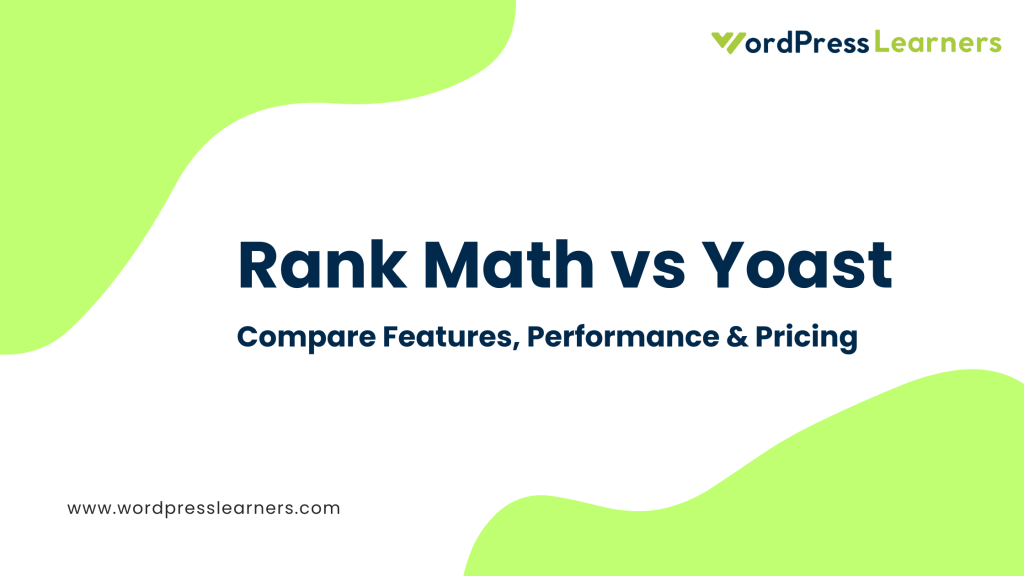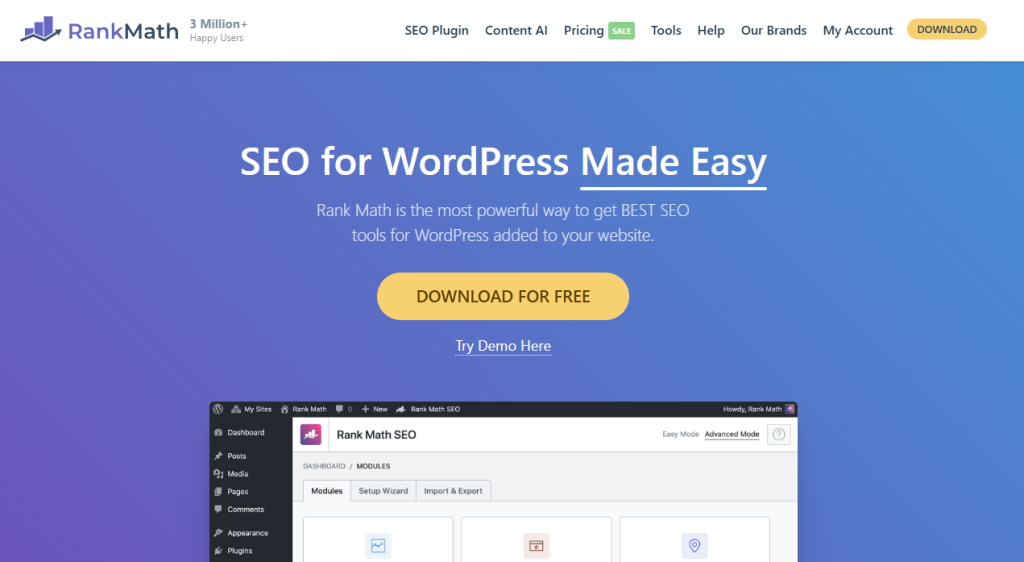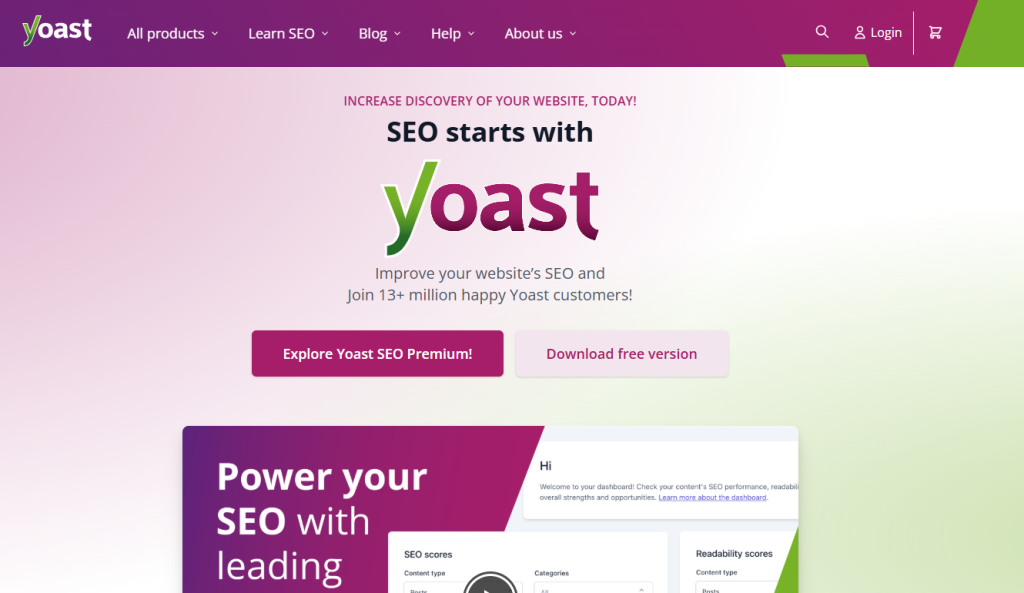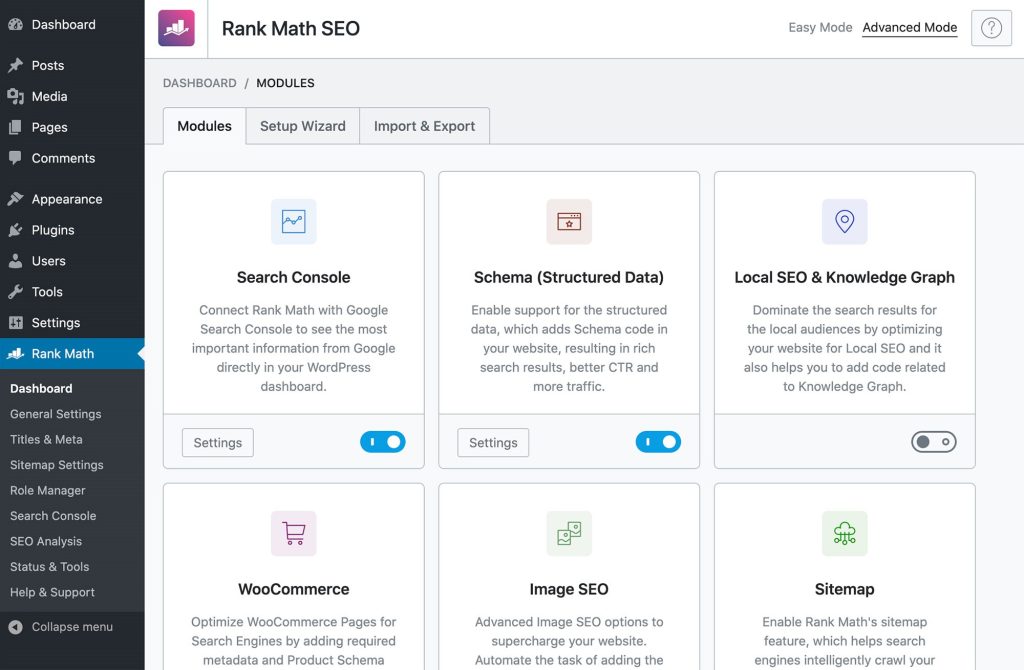
Introduction to Rank Math vs Yoast SEO
In the ever-evolving world of digital marketing, Search Engine Optimization (SEO) is the bedrock of online success. For the millions of websites built on WordPress, an SEO plugin is not a luxury; it’s a necessity. It acts as your on-page SEO co-pilot, guiding you through the technical complexities of schema, meta tags, and keyword analysis. This brings us to the biggest, most debated question in the WordPress community: Rank Math vs. Yoast SEO? Choosing the right tool can dramatically impact your visibility, making a detailed, honest comparison of these two powerhouses essential for any serious website owner.
But the real question is:
Which one should you use? Rank Math or Yoast? That is exactly what this comparison will help you decide.
In this guide, we will compare them based on features, ease of use, pricing, SEO tools, performance, WooCommerce compatibility, and more. I will also share which plugin is better for beginners, agencies, ecommerce, blogs, and local businesses.
Let’s get started.
What is Rank Math?

Rank Math is the newer challenger, often described as the “Swiss Army Knife” of WordPress SEO. Launched in 2018, it quickly gained traction by offering features that were traditionally premium-only in a single, free package. Its core philosophy is to consolidate numerous SEO tools into one streamlined dashboard. Rank Math suits users who prefer an all-in-one, feature-rich solution and appreciate its clean, modular interface. The pricing model is highly competitive: it offers a powerful free version, and its Pro version is generally more affordable than its main competitor for a similar feature set, often including support for multiple websites.
What is Yoast SEO?

Yoast SEO is the established veteran and the original standard-bearer for WordPress SEO, having been around since 2010. Its decades-long presence means it has a massive installation base and a reputation for stability and reliability. Its primary strength lies in its readability and fundamental on-page content analysis, making it exceptionally popular with new bloggers and content-focused sites. Yoast operates on a freemium model: the free plugin covers all basic needs, but essential features like redirect management, internal linking suggestions, and multi-keyword analysis are locked behind the Yoast Premium paywall.
Rank Math vs Yoast SEO: Quick Comparison Table
| Feature | Rank Math | Yoast SEO |
| Pricing | Free + Pro ($59/year) | Free + Premium ($99/year) |
| Setup Process | Easy wizard with import | Moderate, step-by-step |
| Schema Markup | 15+ types built-in (free) | Basic free, advanced needs premium |
| Redirect Manager | Included in free version | Requires Premium subscription |
| Keyword Optimization | Unlimited keywords (free) | 1 keyword free, unlimited with Premium |
| Local SEO | Built into free version | Separate paid extension ($69/year) |
| 404 Monitoring | Included free | Not available |
| Image SEO | Automatic alt text suggestions | Manual optimization only |
| Google Search Console | Direct integration free | Not available |
| Content AI | Available in Pro | Not available |
| WooCommerce Integration | Free built-in features | Separate paid extension ($69/year) |
| Active Installations | 1+ million | 5+ million |
Rank Math vs Yoast SEO: Feature-by-Feature Comparison
The initial setup experience differs significantly between RankMath and Yoast, setting the tone for your entire relationship with each plugin.
Rank Math vs Yoast: Setup & User Interface
Rank Math Setup
Rank Math greets new users with a comprehensive setup wizard that guides you through essential configurations in approximately 10 minutes. The wizard asks about your site type, imports settings if you’re switching from another plugin, connects to Google Search Console, configures sitemap preferences, and sets up schema markup for your content types. The interface uses a modular approach where you can enable or disable specific features, keeping your dashboard clean and focused on the tools you actually use.

Yoast Setup
Yoast SEO takes a slightly different approach with its configuration. After installation, the plugin presents a configuration wizard that walks through basic settings, though it’s somewhat less comprehensive than Rank Math’s wizard. The Yoast interface centers around its metabox that appears below your content editor, displaying the familiar traffic light system for SEO and readability analysis. While this approach has become familiar to millions of users, some find it less flexible than Rank Math’s sidebar implementation. Yoast’s settings are organized under several main menu items, which can feel scattered when you’re trying to configure advanced features.

The user experience in daily use reveals further distinctions. Rank Math’s interface feels more modern and streamlined, with tooltips and contextual help appearing where needed without cluttering the screen. The dashboard provides an overview of SEO issues across your site, making it easy to identify and fix problems. Yoast’s interface emphasizes simplicity for beginners, though this sometimes means advanced users need to dig deeper into settings to find specific options. Both plugins have evolved their interfaces over time, but Rank Math’s newer design incorporates contemporary UI/UX practices that many users find more intuitive.
Rank Math vs Yoast SEO: On-page SEO Optimization
On-page optimization forms the core of any SEO plugin’s functionality, and both contenders in the Yoast vs Rank Math debate offer robust analysis tools.
Rank Math Content Optimization
Rank Math analyzes your content against over 30 different factors, providing specific recommendations for improvement. The plugin checks keyword placement in critical areas like your title, URL, meta description, and content body. It evaluates content length, heading structure, image optimization, internal and external linking patterns, and even assesses your use of focus keywords throughout the text. The analysis updates in real-time as you write, and Rank Math’s scoring system ranges from 0 to 100, giving you a clear target to aim for.
Yoast Content Optimization
Yoast SEO pioneered the content analysis approach with its distinctive traffic light system that shows red, orange, or green indicators for various optimization factors. The plugin examines keyword density, meta description length, title tag optimization, readability metrics, including sentence and paragraph length, use of transition words, passive voice percentage, and Flesch Reading Ease score. While Yoast’s analysis covers fewer technical factors than Rank Math, it places stronger emphasis on content readability and user experience. This focus has helped countless writers create content that appeals to both search engines and human readers.
The practical difference in daily use becomes apparent when optimizing content for multiple keywords. Rank Math allows you to add unlimited focus keywords even in the free version, analyzing your content against each one simultaneously. This proves invaluable when targeting multiple search intents with a single piece of content. Yoast’s free version limits you to one focus keyword per post, requiring the Premium subscription to analyze additional keywords. For content creators working on comprehensive articles that naturally target several related terms, this distinction can significantly impact workflow efficiency and SEO results.
Rank Math vs Yoast SEO: Content AI / Content Analysis
Artificial intelligence has begun transforming how we approach content optimization, and the Rank Math vs Yoast performance in this area shows a clear divergence in product strategy.
Rank Math Pro includes Content AI, a feature that uses advanced algorithms to analyze top-ranking content for your target keywords and provide specific recommendations. The system examines what words and phrases appear in competing content, suggests semantic keywords to include naturally in your writing, recommends optimal content length based on ranking pages, and identifies questions readers are asking about your topic. This data-driven approach helps content creators understand what comprehensiveness and depth Google expects for specific search queries.
Yoast SEO has chosen not to integrate AI-driven content recommendations directly into its plugin. Instead, Yoast focuses on its established readability analysis and SEO checks that have proven effective over the years of use. The company’s position emphasizes that good writing and user-focused content should drive optimization decisions rather than AI recommendations. While this philosophy has merit, it means Yoast users who want AI assistance need to use separate tools or services, adding another step to their workflow. Some users appreciate this separation, preferring to keep their SEO plugin focused on technical optimization while using specialized AI writing assistants for content creation.
The impact of these different approaches depends heavily on your content creation process and expertise level. Experienced SEO professionals might find Yoast’s traditional analysis sufficient, relying on their own research and instincts for content development. Newer content creators or those in competitive niches often benefit from Rank Math’s AI insights, which demystify why certain content ranks and what elements successful pages include. The Content AI feature in Rank Math Pro also helps identify content gaps in your existing articles, suggesting updates that could improve rankings for pieces that have dropped in search results.
Rank Math vs Yoast SEO: Schema & Rich Snippets
Schema markup has evolved from an advanced SEO technique to an essential element of modern search optimization, and the handling of structured data represents a significant difference in the RankMath vs Yoast comparison.
Rank Math includes comprehensive schema support directly in its free version, offering 15+ schema types, including Article, Product, Review, Recipe, FAQ, How-To, Course, Event, Local Business, and more specialized types. The plugin automatically adds an appropriate schema based on your content type, and you can customize every field through an intuitive interface. Rank Math also supports schema templates, allowing you to create reusable configurations for recurring content patterns on your site.
Yoast SEO provides basic schema markup in its free version, implementing organization and website schema automatically. However, accessing the full range of schema types requires Yoast Premium, and even then, the implementation feels less comprehensive than Rank Math’s approach. Yoast focuses heavily on Article schema for blog posts and basic product schema, but implementing more specialized types like FAQ or How-To schema requires manual work or additional plugins. This limitation can frustrate users who want their content to appear with rich snippets in search results, as these enhanced listings can significantly improve click-through rates.
The practical implications extend beyond just having a schema available. Rich snippets generated from proper schema markup can make your search listings more visually appealing and informative, featuring star ratings, price information, cooking times, or answer boxes directly in results. Websites using comprehensive schema often see improved visibility and higher click-through rates even without ranking position changes. Rank Math’s generous inclusion of schema types in its free version removes a significant barrier for small websites and new bloggers who want to compete with larger sites but can’t afford multiple premium plugins or extensions.
Rank Math vs Yoast SEO: Redirect Manager & 404 Monitor
URL redirects form a critical component of website maintenance, especially when restructuring content, fixing broken links, or migrating from another platform. The redirect manager capabilities reveal another substantial difference when comparing Yoast Free vs Rank Math Free.
Rank Math includes a full-featured redirect manager in its free version, supporting 301, 302, 307, 410, and 451 redirect types. You can create redirects individually or in bulk, set up regex patterns for dynamic redirects, import and export redirect lists, and monitor all redirects from a centralized dashboard. The plugin also automatically tracks 404 errors and allows you to create redirects directly from the error log with a single click.
Yoast SEO does not include redirect management in its free version, and accessing this functionality requires upgrading to Yoast Premium. Even with the premium subscription, Yoast’s redirect manager offers more limited functionality compared to Rank Math’s implementation. This creates a common scenario where Yoast users need to install a separate redirect plugin, adding another tool to maintain and potentially creating compatibility concerns. For websites that frequently update content structure or consolidate similar posts, having redirect management integrated with SEO tools streamlines workflow and reduces the risk of broken links damaging search rankings.
| Feature | Rank Math | Yoast |
| Redirect Manager | Free | Paid |
| Automatic Redirects | Yes | Yes (Premium) |
| 404 Error Monitor | Yes | No |
The 404 error monitoring included with Rank Math provides additional value beyond basic redirect management. The plugin tracks which pages are generating 404 errors, how many hits each broken URL receives, and where visitors are coming from when they encounter these errors. This information helps prioritize which redirects to create first, focusing on broken links that actually affect user experience and SEO rather than wasting time on URLs nobody visits. The ability to create redirects directly from the 404 log eliminates the tedious process of copying URLs, opening redirect settings, and manually entering source and destination paths.
Rank Math vs Yoast SEO: Local SEO
Local businesses face unique SEO challenges, requiring specific optimizations that help them appear in local search results and Google Maps. The approach to local SEO represents another divergence in the Rank Math vs Yoast SEO comparison.
Rank Math includes local SEO features in its free version, allowing you to add complete business information, including business name, type, contact details, physical address, opening hours, accepted payment methods, and price range. The plugin adds proper schema markup for local businesses automatically, helping search engines understand your location and services. You can also add multiple locations if you operate several physical stores or service centers.
Yoast takes a different approach by offering Local SEO as a separate paid extension priced at $69 per year for a single site. The Yoast Local SEO extension provides similar functionality to Rank Math’s built-in features, including business information management, opening hours, multiple locations, store locator functionality, and integration with Google Maps. While Yoast’s extension offers some additional features like the store locator and enhanced map options, many small local businesses find the extra cost difficult to justify when Rank Math provides the essential features for free.
The practical impact affects local businesses differently based on their sophistication and budget. A small local restaurant or retail shop operating on tight margins benefits significantly from Rank Math’s included local SEO features, getting proper structured data without additional investment. Larger local businesses with multiple locations and bigger budgets might find value in Yoast’s dedicated extension if they need advanced features like the store locator. However, the majority of local businesses can achieve excellent local search visibility using Rank Math’s built-in capabilities combined with a properly optimized Google Business Profile and consistent local citations.
Rank Math vs Yoast SEO: WooCommerce SEO
Online stores require specialized SEO considerations for product pages, categories, and e-commerce-specific structured data. The WooCommerce optimization capabilities differ substantially between these plugins.
Rank Math provides built-in WooCommerce SEO features in both its free and pro versions, automatically adding product schema markup, optimizing product titles and descriptions, handling category and tag SEO, managing breadcrumbs for shop pages, and implementing proper canonical URLs for product variations. The plugin recognizes WooCommerce installations and adapts its interface to show e-commerce-specific options without requiring additional extensions or configuration.
Yoast offers WooCommerce SEO as a separate paid extension costing $69 per year for a single site, or bundled with higher-tier subscriptions. The Yoast WooCommerce SEO extension adds product schema markup, optimizes product pages for search and social media, improves category and tag management, and provides specific guidance for e-commerce content optimization. While Yoast’s extension integrates well with the main plugin and offers solid functionality, the additional cost adds up quickly for store owners already paying for Yoast Premium if they want full functionality.
Store owners comparing Yoast Premium vs Rank Math Pro for their e-commerce sites will find Rank Math’s approach more cost-effective and streamlined. A single Rank Math Pro subscription provides everything needed for comprehensive WooCommerce SEO without juggling multiple extensions and renewals. This becomes particularly relevant for agencies managing several client stores or entrepreneurs running multiple shops, where per-site licensing costs multiply quickly. The integrated approach also means fewer potential compatibility issues and update conflicts, simplifying maintenance while delivering professional results.
Rank Math vs Yoast SEO: Page Builder Compatibility
Modern WordPress websites increasingly rely on page builders for design flexibility, making compatibility with these tools essential for any SEO plugin. Both plugins work with popular page builders, but implementation differences affect user experience.
Rank Math integrates seamlessly with Elementor, Gutenberg, Beaver Builder, Divi, and other major page builders. The plugin’s sidebar interface adapts to different builders, maintaining full functionality regardless of how you create content. Rank Math can analyze content created with page builders, recognizing heading structures, paragraph text, and other elements, even when they’re generated through builder widgets rather than standard WordPress content areas.
Yoast SEO also supports major page builders, though the experience varies depending on which builder you use. With Gutenberg, Yoast’s integration feels native and complete. However, some users report less seamless experiences with certain third-party builders, occasionally finding that Yoast’s analysis doesn’t recognize content structured through builder elements. Yoast has improved page builder compatibility over time, but the metabox approach can sometimes feel disconnected from the visual building experience, requiring you to switch between the builder and Yoast interfaces to optimize content.
Rank Math vs Yoast SEO: Support & Documentation
Quality support and comprehensive documentation can make the difference between efficiently solving problems and hours of frustration.
Rank Math provides free support through their official WordPress.org forum, where community members and team representatives respond to questions. Rank Math Pro subscribers get access to priority support with guaranteed response times, direct email support channels, and a comprehensive knowledge base covering common scenarios and advanced configurations. The Rank Math team maintains active video tutorials on YouTube, covering everything from basic setup to advanced optimization techniques. The documentation is well-organized and searchable, with regular updates reflecting new features.
Yoast SEO offers similar tiered support, with free users accessing the WordPress.org support forum and extensive online documentation. The Yoast knowledge base is particularly comprehensive, reflecting years of accumulated content covering virtually every scenario users might encounter. Yoast Premium subscribers receive 24/7 email support from Yoast’s support team, which has built a reputation for thorough, helpful responses. Yoast also invests heavily in educational content through their blog, creating guides that teach SEO concepts beyond just plugin usage. This educational approach has helped many users develop their SEO skills while learning the plugin.
The effectiveness of support often depends on your problem’s nature and urgency. Both plugins maintain professional support operations that generally respond within reasonable timeframes. Rank Math’s priority support tends to be more responsive for technical issues and feature questions, while Yoast’s extensive documentation often allows users to self-serve solutions without waiting for support responses. The larger Yoast user community means more third-party tutorials, forums, and resources are available, though this can be a double-edged sword when outdated information causes confusion. Neither plugin leaves users stranded, but both could benefit from enhanced support for free users who represent the majority of their user bases.
Rank Math vs Yoast SEO: Integration & Automation
Modern SEO tools work best when integrated with other platforms and analytics systems, and automation capabilities reduce repetitive manual work.
Rank Math excels in this area with direct Google Search Console integration built into the free version. The plugin pulls data directly from Search Console, displaying search analytics, performance metrics, keyword rankings, and indexing issues within your WordPress dashboard. This integration eliminates constant tab-switching and makes it easier to connect content performance with optimization efforts. Rank Math also offers Google Analytics integration, instant indexing support for faster search engine discovery, and automated image SEO features that optimize alt tags and file names.
Yoast SEO does not include Google Search Console integration in any version, requiring users to visit Search Console separately for performance data. While Yoast offers integration with other analytics platforms through third-party plugins and services, the lack of built-in Search Console connectivity feels like a missed opportunity given how central that data is to SEO decision-making. Yoast does provide good integration with social media platforms, automatically generating proper Open Graph and Twitter Card markup to control how your content appears when shared. The plugin also connects with various content analysis services and offers API endpoints for developers building custom integrations.
Rank Math vs Yoast SEO: Performance & Page Speed
In the debate of Rank Math vs Yoast performance, Rank Math often holds a slight edge. Being a newer plugin, Rank Math was built with code efficiency and modularity in mind. Its codebase is generally considered lighter and less prone to bloating the website, as users can disable unused modules. Yoast is a legacy plugin, and while the developers have worked to clean up the code over the years, many users report it carrying a slightly heavier footprint on site loading times, especially when all its features are active. In short, Rank Math typically provides better code efficiency and less impact on page speed.
Rank Math vs Yoast SEO: Free and Paid Comparison
Understanding what you get at each pricing tier helps you make cost-effective decisions and avoid surprise limitations.
Rank Math Free vs Yoast Free
| Feature | Rank Math Free | Yoast Free |
| Focus Keywords | Supports multiple focus keywords | Only one focus keyword allowed |
| Content Analysis | Yes, keyword and readability scoring | Yes, keyword and readability scoring |
| Redirect Manager | Included for free | Available only in premium |
| 404 Error Monitor | Included | Not included |
| Schema Markup | Full schema module included with multiple schema types | Basic schema only, advanced types limited |
| Local SEO Features | Basic local SEO support available | Requires Yoast Local SEO paid add-on |
| WooCommerce SEO | Basic support included | Requires Yoast WooCommerce SEO add-on |
| Google Analytics Integration | Has a built-in analytics dashboard | Not included |
| Search Console Integration | Built-in auto integration | Requires manual integration steps |
| Internal Link Suggestions | Available in free | Available only in premium |
| Image SEO Automation (alt tagging suggestions) | Yes, suggests missing alt attributes | Yes, but not as detailed |
| UI and Dashboard Style | Clean, modern, modular interface | Traditional interface familiar to long-time users |
| Setup Wizard | Very beginner friendly, auto config features | Beginner friendly but more manual settings |
| Plugin Performance / Weight | Lightweight, modules can be turned off for speed | Slightly heavier, more background processes |
| Free Version Overall Value | Extremely high value | Basic and limited, encourages premium upgrade |
Rank Math Premium vs Yoast Premium
| Feature | Rank Math Pro / Business / Agency | Yoast Premium (+ Add-ons) |
| Pricing Model | One plan can support multiple sites depending on license level | Premium is per site, and add-ons cost extra |
| Multiple Focus Keywords | Included in all premium plans | Included in premium |
| Redirect Manager | Included | Included in premium |
| 404 Error Monitor | Included | Not included |
| Complete Schema Builder | Fully flexible schema editor included | Good schema, but advanced customization requires experience or add-ons |
| Local SEO | Included in Rank Math Business and above | Requires Yoast Local SEO paid add-on |
| WooCommerce SEO | Included in Rank Math Business and above | Requires Yoast WooCommerce SEO paid add-on |
| News / Video SEO | Covered in Rank Math Pro and higher plans | Requires Yoast News SEO and Yoast Video SEO add-ons |
| AI Writing and Content Suggestions | Content AI support available with credits | No built-in AI writing assistance |
| Keyword Rank Tracking | Built-in rank tracker available | Not included, requires external tool |
| Analytics Dashboard | Google Analytics + Search Console reporting inside WordPress | No integrated analytics dashboard |
| Role Manager / Client Management | Included, useful for agencies and teams | Limited controls unless using multisite setup |
| Performance Impact | Lightweight module-based system | Slightly heavier plugin load in some setups |
| Support | Ticket-based priority support in premium | Strong support and documentation, ticket support in premium |
| Best For | Agencies, bloggers, ecommerce stores wanting an all-in-one SEO stack | Users who prefer Yoast’s writing workflow and do not mind add-on costs |
Which Plugin Should You Use?
The ultimate decision between Rank Math Pro vs Yoast Premium depends entirely on your needs:
- New bloggers: Yoast SEO is a safe, simple bet. The clarity of the traffic light system and the focus on readability are perfect for developing good content habits.
- Agencies & Developers: Rank Math Pro is the superior choice. The multi-site support on Pro licenses, the built-in redirect manager, and the advanced technical controls make managing dozens of client sites more efficient and cost-effective.
- Local Businesses & E-commerce stores: Rank Math is generally better. Yoast requires expensive add-ons for Local SEO and WooCommerce, whereas Rank Math bundles these features more affordably.
- Users Focused on Technical SEO: Rank Math wins due to its comprehensive, free Schema generator and GSC integration.
Final Verdict: Rank Math vs Yoast SEO
The question of rankmath vs yoast doesn’t have a single universal answer, but clear patterns emerge when examining specific use cases and priorities. For the majority of WordPress users, Rank Math delivers superior value through its generous free version, modern interface, and comprehensive feature set. The plugin’s approach of including advanced capabilities like schema markup, redirect management, and unlimited keyword optimization without paywalls makes professional SEO accessible to websites at any budget level. The performance optimization ensures it won’t slow down your site, while the intuitive design reduces the learning curve for beginners without sacrificing depth for advanced users.
Rank Math represents the better choice for new websites and blogs starting their SEO journey, agencies and freelancers managing multiple client sites, local businesses needing local SEO without extra costs, ecommerce stores running WooCommerce shops, budget-conscious users wanting advanced features free, and anyone who values modern interfaces and integrated workflows. The transition from other WordPress SEO plugins to Rank Math is straightforward thanks to the import wizard, and the comprehensive documentation helps users maximize the plugin’s extensive capabilities.
Yoast SEO remains a solid option for specific scenarios where its particular strengths align with user needs. The plugin suits users who have optimized hundreds or thousands of posts with Yoast and prefer continuity, organizations that prioritize established track records and conservative approaches, those who find Yoast’s readability analysis and traffic light system more intuitive, websites requiring specialized extensions for News SEO or Video SEO, and users already invested in Yoast Premium with custom integrations. Yoast’s long history and massive user base provide reassurance, and the plugin’s stability benefits sites where SEO is working well and changes carry risk.
The comparison of rank math vs yoast performance, features, and pricing clearly indicates Rank Math offers more functionality for less money in most situations. The free versions aren’t comparable in capability, with Rank Math providing features Yoast reserves for paid tiers. When comparing premium versions, Rank Math Pro costs less while including Content AI, unlimited site licensing, and avoiding the need for separate extensions. The performance benchmarks consistently show Rank Math adding less overhead to WordPress installations.
